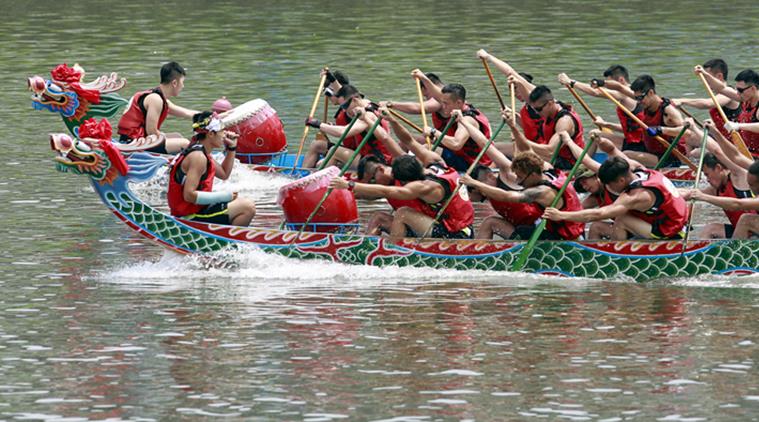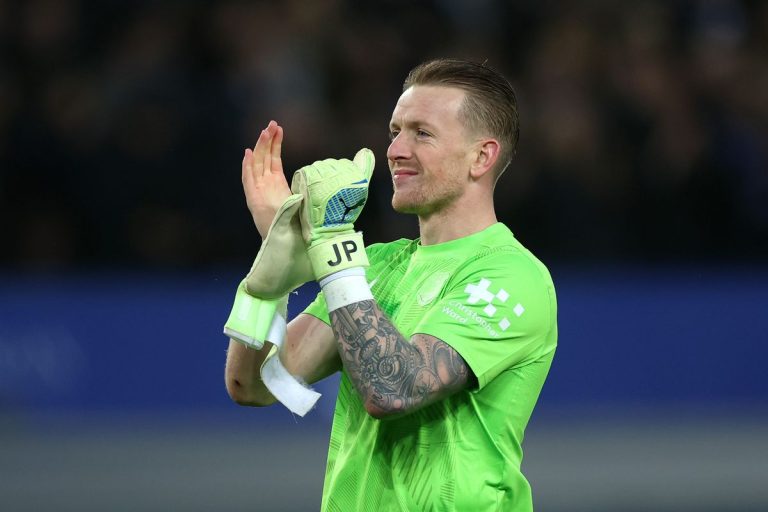There was no dividing them. The folk song Arirang played and the “unification” flag was raised to celebrate the first gold medal by a combined Koreas team at a major multi-sport event.
The crew comprising South Koreans and North Koreans won the 500-meter dragon boat final on Sunday at the Asian Games co-host city of Palembang, a day after the paddlers delivered the historic first medal for a combined Koreas team by taking bronze in the 200-meter dragon boat competition.
The gold was awarded to Korea — the name for the joint teams that are entered in rowing, canoeing and women’s basketball — rather than being added to the tally of either North or South Korea.
The celebrations started as soon as the dragon-headed boat with its 10 paddlers, its drummer and its sweep crossed the line.
Koreans hugged on the boat and on the banks along the course.
South Korean news agency Yonhap quoted Kim Kwang Chol, a North Korean coach, as saying he “felt the strength of a unified nation when we came together, dedicated our minds to a single purpose, and paddled the boat forward.”
The Koreas, still technically at war after their 1950-53 conflict ended in an armistice, have fielded 60 athletes in combined teams in the three sports along with larger contingents for their respective national squads.
Athletes from both countries paraded into the opening ceremony together last weekend behind the “unification” flag, which features the outline of the peninsula in blue on a white background. It took a week to reap the medals.
Kim, the North Korean coach, said he wasn’t sure when he took his paddlers to South Korea for practice last month that they’d have enough time to prepare.
“But I noticed that the North and South Korean athletes’ fighting spirit was so high after watching them train,” Kim was quoted as saying by Yonhap. “As I saw our boat going forward with the athletes’ combined effort and strength, I felt the united power of Korea.”
In the 500, the Koreans finished in 2 minutes, 24.788 seconds to hold off China and Thailand.
There could be more gold for the Koreas, too, with the combined women’s basketball team reaching the semifinals.
South and North Korea have entered joint teams in previous international events, starting with the 1991 table tennis world championships, and more recently at the Winter Olympics in Pyeongchang, South Korea.
The women’s Olympic ice hockey team gained huge support despite losing all of its games, and inspired more cooperation.
The basketball team, featuring nine South Koreans and three players from the North, next plays Taiwan.
North Korea produced a sister act when Olympic champion Rim Jong Sim won the 75-kilogram weightlifting division a day after her younger sibling Rim Un Sim won the 69-kilogram class.
Capping a day of athletics that started with the furthest event and finished with the fastest, Asian record-holder Su Bingtian won the 100 meters in a games record 9.92 seconds.
The Chinese sprinter was a hot favorite for gold, but world junior champion Lalu Muhammad Zohri was the crowd favorite.
The 18-year-old from the earthquake-ravaged island of Lombok got a good taste of life in the fast lanes, finishing seventh in a personal best 10.20.
In a surprising women’s 100, Nigeria-born Bahrain sprinter Edidiong Odiong dipped late to finish in 11.30 and edge India’s Dutee Chand and 2014 champion Wei Yongli in a photo finish.
World champion Rose Chelimo won the women’s marathon for Bahrain in 2 hours, 34 minutes, 51 seconds.
Among the other athletics finals, world championship silver medalist Salwa Naser won the women’s 400 in 50.09 seconds, holding off world junior champion Hima Das of India, and Sudan-born world championship bronze medalist Abdalelah Hassan won the men’s 400 for Qatar in 44.89.
China picked up golds from world champion Gong Lijiao in the women’s shot put and 2015 world championship bronze medalist Wang Jianan in the long jump.
While China is dominating the medals standings, there won’t be any gold, silver or bronze added in men’s singles in badminton, a sport the nation loves.
Chen Long lost to Indonesia’s Anthony Sinisuka Ginting 21-19, 21-11 in the quarterfinals, meaning China is set to miss a medal in the men’s singles for just the second time since 1970.
















